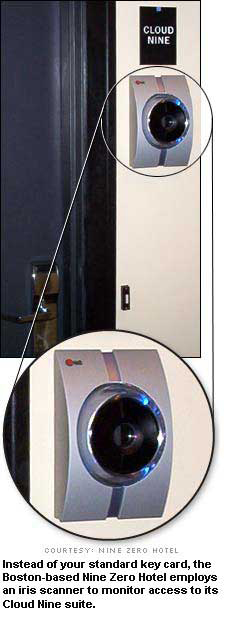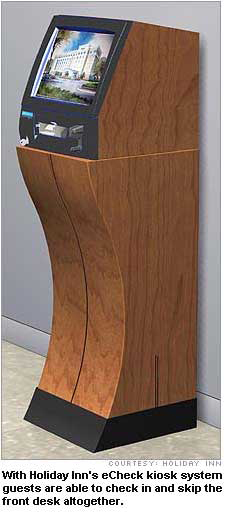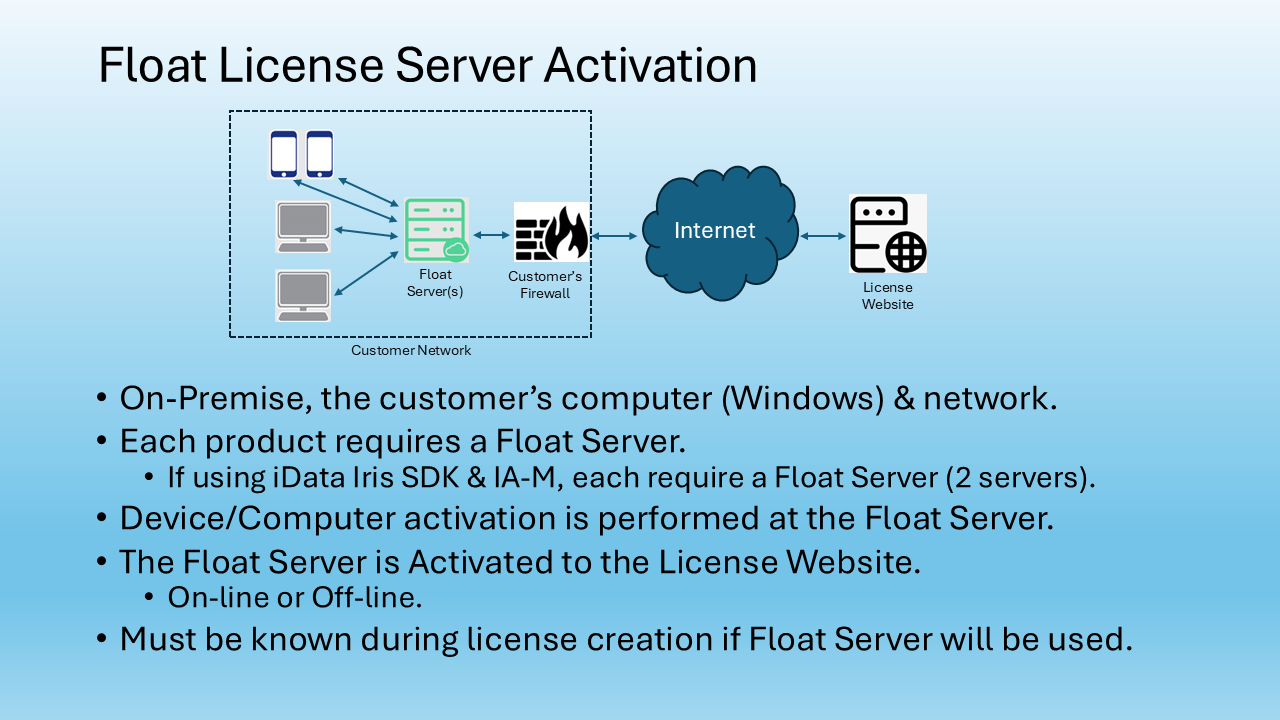by Dave Ellis, CNNMoney.com
http://money.cnn.com/2006/02/14/news/companies/hotels_future/index.htm
 From self check-in to iPod docks to rooms that literally take your temperature, your next hotel stay could be light years ahead of expectations.
From self check-in to iPod docks to rooms that literally take your temperature, your next hotel stay could be light years ahead of expectations.
NEW YORK (CNNMoney.com) – It could have been the front desk clerk who moved at a snail’s pace or that sorry excuse for a thermostat that soured your last visit to a hotel.
Road warriors and vacation travelers fear not. With money to spend and guests at stake, the world’s hotels are getting a tech makeover.
Instead of your standard key card, the Boston-based Nine Zero Hotel employs an iris scanner to monitor access to its Cloud Nine suite.
With Holiday Inn’s eCheck kiosk system guests are able to check in and skip the front desk altogether.
Whether it’s iris-scanning technology, iPod docking stations, or rooms that tailor themselves to your body temperature, the hotel of the future may only be a few reservations away.
“We’re at the beginning of a sea change in terms of technology in hotel guest rooms from what guests expect and need,” said John Cahill, chief information officer at the New York-based Affinia hotel chain and the co-author of “Managing Computers in the Hospitality Industry.”
After the Sept. 11 terrorist attacks, travel and hotel bookings plummeted, and the lodging industry spent the next several years pulling back on upgrades and improvements.
But since 2003, the hotel business has rebounded, with domestic sales climbing almost 8 percent to $113.7 billion during 2004, the latest figures available, according to the American Hotel & Lodging Association.
 As a result, new technologies like self-check-in kiosks are cropping up as chains try to win new customers, keep old ones coming back, and cut costs when they can.
As a result, new technologies like self-check-in kiosks are cropping up as chains try to win new customers, keep old ones coming back, and cut costs when they can.
Some chains like Starwood’s (Research) Sheraton hotels have installed kiosks that allow guests to swipe their credit card, get a room key in minutes, and bypass the front desk altogether.
Intercontinental’s (Research) Holiday Inn chain is testing its “eCheck” system in Duluth, Ga., that allows guests to print boarding passes as they head out for the airport.
After years of false starts, the self-check-in concept is finally gaining momentum, said Richard Penner, a professor at Cornell University’s School of Hotel Administration.
“The idea of checking into hotel at a kiosk no longer seems foreign to people in the hotel industry,” said Penner. “Customers are so eager to get to their room and take their shoes off.”
One industry executive, Richard Senechal, senior vice president of facilities for Loews Hotels, a unit of Loews Corp. (Research), has gone so far as to call the front desk “a dead duck.”
One day, you may be able to use your own handheld device to check yourself in, or a hotel staffer might do it for you, getting a read on your preferences in the process.
“I think you can make it an even more personal engagement,” Senechal said.
Technology and room to spare
While the streamlined front desk is clearly coming, traveling technophiles may also be wowed by their in-room experience, industry experts said.
First, say goodbye to those clunky old TV sets. Tom Lattin, a professor at the Conrad N. Hilton College at the University of Houston estimates that all the major hotel chains will have flat-screen TVs in place in the next few years.
Besides improved picture quality and more space in the rest of the room, the TV could become a device for consumers to get content of their choice.
Reid Paul, editor of the hotel industry publication Hospitality Technology, said that could include everything from your local hometown news to a European soccer match. And don’t be surprised if your room comes outfitted for your arsenal of wireless devices, such as a docking station on your nightstand for your iPod.
“I think a lot of leading hotel execs feel that they can do a better job of delivering content that viewers really want,” said Paul. “They are trying to make the experience more unique and customized around the individual guest.”
While experts predict that Internet access will become gratis and in-room telephones will migrate to Internet calling or disappear altogether, other innovations are showing up as well.
The Nine Zero Hotel in Boston, owned by parent company Lowe Enterprises Inc., for example, opted for iris-scanning technology on the doorway of its Cloud Nine suite instead of a key card system.
“Its been incredibly user-friendly, reliable and hassle free and very, very convenient,” said Tom Holtmann, operations director at the hotel, where rates for its 190 rooms start at $259 a night.
The St. Martin’s Lane Hotel, in the Covent Gardens section of London, paints the walls of its rooms a simple white, but guests are allowed to dial a light display, altering the color of their room anywhere from deep violet to a jungle green.
A growing number of hotels, including the Peninsula in Beverly Hills and the Conrad in Miami, are signing on to the concept of a “Pure Room.”
Developed by Pure Solutions in Buffalo, N.Y., the room gets a seven-step cleaning process including an ozone shock treatment, making it free from odors and resistant to mold, dust mites and other irritants, the company says.
Eight hotels in the luxury Mandarin Oriental Hotel Group, including its New York location, have rooms outfitted to remember preferences of regular visitors — so when a regular walks into a room, the lights, room temperature and speed dial on the phone are set to their specifications.
Danielle DeVoe, a spokeswoman for closely held Mandarin Oriental hotels, said these services work to distinguish her chain from the competition.
“Advanced in-room technology is critical in how we attract guests to our hotels and hideaway properties,” said DeVoe.
Checking out the future
That desire by hotel chains to distinguish themselves could shake things up down that road, said Andrew Zolli, a self-described “futurist” and president of Z Plus Partners, a New York brand consulting firm.
Zolli said he spoke at recent industry conference about how aging baby boomers could make “health-monitoring” rooms a popular feature in years to come.
What might they include? Sensors in the toilet that measure blood sugar in your urine, or infrared cameras that track your body temperature and send a message to regulate the thermostat and humidity in your room to ensure a restful night’s sleep.
And don’t be surprised if “carbon-neutral” hotels, which might feature eco-friendly products or organic foods on their room service menus, take off, Zolli said. “The boomers want to keep up with the Jones, and the Jones are realigning their chakras and driving hybrid cars,” he said.
So who’s going to foot the bill for the new gadgets?
That depends on the hotel, said Hospitality Technology’s Paul. Luxury brands might absorb some of the costs but in two- and three-star properties, the guest may foot the bill.
Either way, hotels will try their best to not raise rates.
“It’s much easier to charge for individual services than to raise room rates,” said Paul. “That’s the ultimate goal in a lot of ways — to find ways to generate more revenue without raising rates.”
As far as the arrival date for the hotel of the future.
“That’s so hard to tell,” said Senechal at Loews. “All it takes is one company to say ‘the next thing we’ll do is this’ and it becomes the industry standard.”

